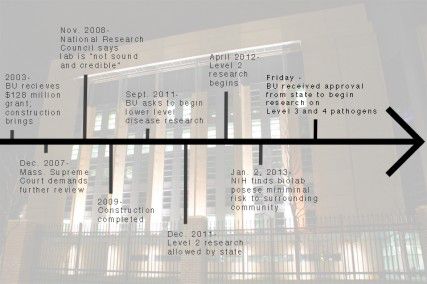The Boston University National Emerging Infectious Diseases Laboratories gained approval from the Massachusetts state government Friday to begin researching biosafety Level 3 and Level 4 pathogens, officials said.
“The Massachusetts Secretary of Energy and Environmental Affairs [Richard Sullivan, Jr.] issued, under the Massachusetts Environmental Policy Act, a certificate for the NEIDL ,” said Ellen Berlin, BU spokeswoman for the NEIDL. “This action is essentially the state’s approval for BSL [biosafety Level] 3 and BSL 4 research to be conducted in the NEIDL.”
Although biolab officials must still seek other documentations and approvals before beginning research on some of the most dangerous infectious diseases, the state’s approval is a significant step, Berlin said.
“This is the first of final state permits,” Berlin said. “What will happen now is that NEIDL will request permission from the Boston Public Health Commission to transfer some ongoing BSL 3 research from an existing BSL 3 laboratory on the campus to the NEIDL.”
Sullivan’s report stated the Supplemental Final Environmental Impact Report, which was filed in January and found the biolab poses a minimal risk to the surrounding community, adequately and properly complies with the MEPA and with its implementing regulations, according to a Friday BU press release.

“We are pleased that the MEPA process has had a positive finding,” said Interim NEIDL Director John Murphy in the release. “Our research will make important contributions toward improving public health and will have local, national and global impact.”
This approval allows NEIDL to begin applying for state permits to expand research, Berlin said. The first Level 3 pathogens that will be studied will be tuberculosis-related bacteria.
If final approval is granted, the biolab will conduct research on other diseases such as SARS, anthrax, Ebola, pneuomic plague and the 1918 H1N1 influenza. The goal of the research is to find new ways to treat the diseases and develop vaccines.
“For the BSL 4 research, that will not begin until a couple of other regulatory and judicial determinations are made,” Berlin said.
Biolab researchers began working with Level 2 pathogens in April.
The biolab has received significant criticism from the surrounding community. Protesters have raised concerns over the biological threats posed to the area.
Friday’s approval came after the National Institutes of Health released a 2,717-page report detailing an investigation on potential safety risks the lab may pose to the public. The report took the public’s concern of the biolab into consideration.
“There was an extensive community process and NIH undertook a very significant and thorough risk analysis, and it took a lot of time,” Berlin said. “They were very deliberate about their work.”


















































































































